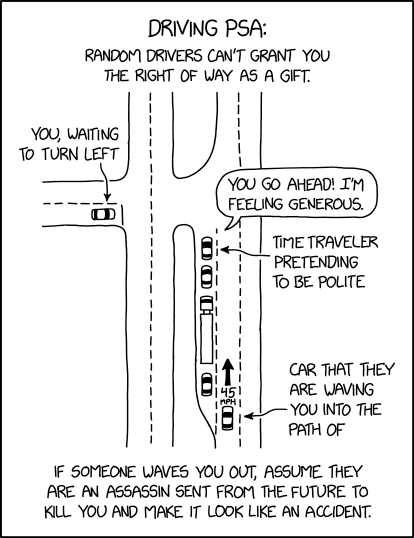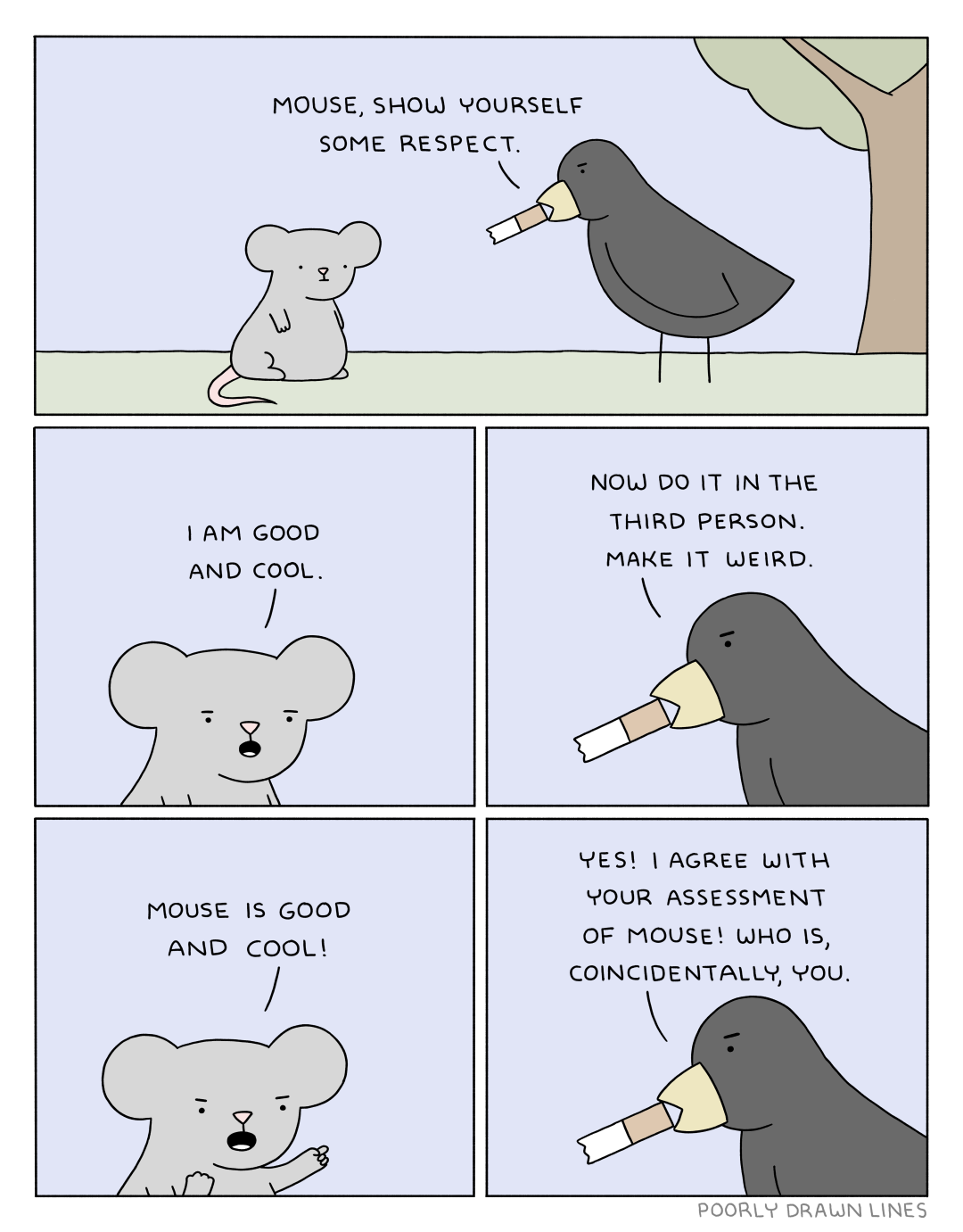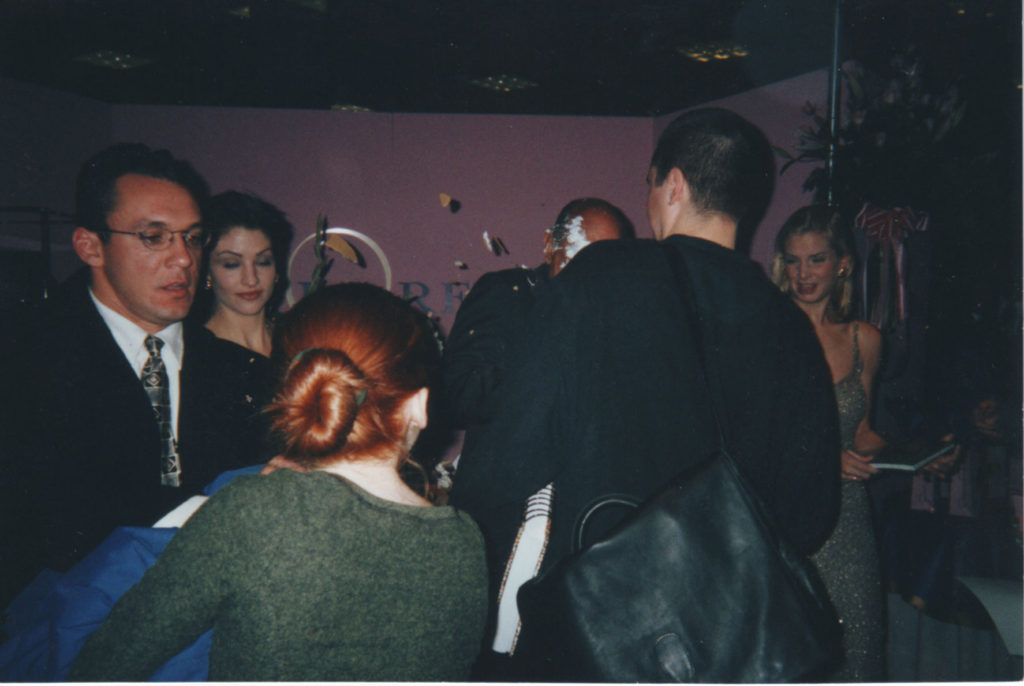Cowboy Who?
Shared posts
Comic for 2024.05.15 - Gonna Jump
Former Trump Aide Claims To Give Fake Money To Unhoused People

Johnny McEntee, a former aide in the Trump White House, recently bragged on social media about giving fake money to unhoused people to ensure their eventual arrest, claiming on TikTok that “when a homeless person asks for money, then I give them like a fake $5 bill. So I feel good about myself. They feel good. And…
1-Bedroom Condo For Woman Who Is Still Single At 35

There’s a deadline for love, and some people just miss it, you know? Shhh, it’s okay. Don’t cry now.
Cartier Introduces New Diamond-Encrusted Gastric Lap-Band

PARIS—Calling its latest piece a “must-have for anyone with a discerning eye” who is preparing to undergo bariatric surgery, the prestigious jewelry firm Cartier introduced a new diamond-encrusted gastric lap-band Friday retailing for $97,000. “The Maison Cartier is pleased to introduce a high-end implanted medical…
Dole Salad Kits Now Include Framed Certificate Confirming Owner Has Eaten Salad

CHARLOTTE, NC—Offering its customers a way to commemorate their consumption of a healthy and fiber-rich meal, fruit and vegetable producer Dole announced Wednesday that its salad kits now included a framed certificate confirming the bearer of the document had eaten a salad. “By executive order of the Salad Institute…
Rex could see it was a classic fracturing of the space time continuum, but he’d probably still get…

Rex could see it was a classic fracturing of the space time continuum, but he’d probably still get the blame.
Wizard Reprimanded For Watching Porn On His Work Orb

THE CASTLE OF ISIDORE—Scolding the associate magister for his inappropriate use of guild resources, the High Council at Calazar Keep reportedly reprimanded wizard Ashkahol the Geomancer for watching porn on his work orb Tuesday. “We’ve told Ashkahol repeatedly that we’re trying to maintain a professional sorcery…
Roaring Kitty Once Again Drives Up Stock Prices For GameStop, AMC

Keith Gill, better known by his online persona Roaring Kitty, posted for the first time in three years since instigating the 2021 GameStop short squeeze, once again causing that company and other meme stocks such as AMC to jump as much as 60% this week before trading was halted for volatility. What do you think?
Pluralistic: AI "art" and uncanniness (13 May 2024)
Today's links
- AI "art" and uncanniness: "A meaning that does not stem from organizing intention."
- Hey look at this: Delights to delectate.
- This day in history: 2004, 2009, 2014, 2019, 2023
- Upcoming appearances: Where to find me.
- Recent appearances: Where I've been.
- Latest books: You keep readin' em, I'll keep writin' 'em.
- Upcoming books: Like I said, I'll keep writin' 'em.
- Colophon: All the rest.
AI "art" and uncanniness (permalink)
When it comes to AI art (or "art"), it's hard to find a nuanced position that respects creative workers' labor rights, free expression, copyright law's vital exceptions and limitations, and aesthetics.
I am, on balance, opposed to AI art, but there are some important caveats to that position. For starters, I think it's unequivocally wrong – as a matter of law – to say that scraping works and training a model with them infringes copyright. This isn't a moral position (I'll get to that in a second), but rather a technical one.
Break down the steps of training a model and it quickly becomes apparent why it's technically wrong to call this a copyright infringement. First, the act of making transient copies of works – even billions of works – is unequivocally fair use. Unless you think search engines and the Internet Archive shouldn't exist, then you should support scraping at scale:
https://pluralistic.net/2023/09/17/how-to-think-about-scraping/
And unless you think that Facebook should be allowed to use the law to block projects like Ad Observer, which gathers samples of paid political disinformation, then you should support scraping at scale, even when the site being scraped objects (at least sometimes):
https://pluralistic.net/2021/08/06/get-you-coming-and-going/#potemkin-research-program
After making transient copies of lots of works, the next step in AI training is to subject them to mathematical analysis. Again, this isn't a copyright violation.
Making quantitative observations about works is a longstanding, respected and important tool for criticism, analysis, archiving and new acts of creation. Measuring the steady contraction of the vocabulary in successive Agatha Christie novels turns out to offer a fascinating window into her dementia:
https://www.theguardian.com/books/2009/apr/03/agatha-christie-alzheimers-research
Programmatic analysis of scraped online speech is also critical to the burgeoning formal analyses of the language spoken by minorities, producing a vibrant account of the rigorous grammar of dialects that have long been dismissed as "slang":
Since 1988, UCL Survey of English Language has maintained its "International Corpus of English," and scholars have plumbed its depth to draw important conclusions about the wide variety of Englishes spoken around the world, especially in postcolonial English-speaking countries:
https://www.ucl.ac.uk/english-usage/projects/ice.htm
The final step in training a model is publishing the conclusions of the quantitative analysis of the temporarily copied documents as software code. Code itself is a form of expressive speech – and that expressivity is key to the fight for privacy, because the fact that code is speech limits how governments can censor software:
https://www.eff.org/deeplinks/2015/04/remembering-case-established-code-speech/
Are models infringing? Well, they certainly can be. In some cases, it's clear that models "memorized" some of the data in their training set, making the fair use, transient copy into an infringing, permanent one. That's generally considered to be the result of a programming error, and it could certainly be prevented (say, by comparing the model to the training data and removing any memorizations that appear).
Not every seeming act of memorization is a memorization, though. While specific models vary widely, the amount of data from each training item retained by the model is very small. For example, Midjourney retains about one byte of information from each image in its training data. If we're talking about a typical low-resolution web image of say, 300kb, that would be one three-hundred-thousandth (0.0000033%) of the original image.
Typically in copyright discussions, when one work contains 0.0000033% of another work, we don't even raise the question of fair use. Rather, we dismiss the use as de minimis (short for de minimis non curat lex or "The law does not concern itself with trifles"):
https://en.wikipedia.org/wiki/De_minimis
Busting someone who takes 0.0000033% of your work for copyright infringement is like swearing out a trespassing complaint against someone because the edge of their shoe touched one blade of grass on your lawn.
But some works or elements of work appear many times online. For example, the Getty Images watermark appears on millions of similar images of people standing on red carpets and runways, so a model that takes even in infinitesimal sample of each one of those works might still end up being able to produce a whole, recognizable Getty Images watermark.
The same is true for wire-service articles or other widely syndicated texts: there might be dozens or even hundreds of copies of these works in training data, resulting in the memorization of long passages from them.
This might be infringing (we're getting into some gnarly, unprecedented territory here), but again, even if it is, it wouldn't be a big hardship for model makers to post-process their models by comparing them to the training set, deleting any inadvertent memorizations. Even if the resulting model had zero memorizations, this would do nothing to alleviate the (legitimate) concerns of creative workers about the creation and use of these models.
So here's the first nuance in the AI art debate: as a technical matter, training a model isn't a copyright infringement. Creative workers who hope that they can use copyright law to prevent AI from changing the creative labor market are likely to be very disappointed in court:
https://www.hollywoodreporter.com/business/business-news/sarah-silverman-lawsuit-ai-meta-1235669403/
But copyright law isn't a fixed, eternal entity. We write new copyright laws all the time. If current copyright law doesn't prevent the creation of models, what about a future copyright law?
Well, sure, that's a possibility. The first thing to consider is the possible collateral damage of such a law. The legal space for scraping enables a wide range of scholarly, archival, organizational and critical purposes. We'd have to be very careful not to inadvertently ban, say, the scraping of a politician's campaign website, lest we enable liars to run for office and renege on their promises, while they insist that they never made those promises in the first place. We wouldn't want to abolish search engines, or stop creators from scraping their own work off sites that are going away or changing their terms of service.
Now, onto quantitative analysis: counting words and measuring pixels are not activities that you should need permission to perform, with or without a computer, even if the person whose words or pixels you're counting doesn't want you to. You should be able to look as hard as you want at the pixels in Kate Middleton's family photos, or track the rise and fall of the Oxford comma, and you shouldn't need anyone's permission to do so.
Finally, there's publishing the model. There are plenty of published mathematical analyses of large corpuses that are useful and unobjectionable. I love me a good Google n-gram:
And large language models fill all kinds of important niches, like the Human Rights Data Analysis Group's LLM-based work helping the Innocence Project New Orleans' extract data from wrongful conviction case files:
https://hrdag.org/tech-notes/large-language-models-IPNO.html
So that's nuance number two: if we decide to make a new copyright law, we'll need to be very sure that we don't accidentally crush these beneficial activities that don't undermine artistic labor markets.
This brings me to the most important point: passing a new copyright law that requires permission to train an AI won't help creative workers get paid or protect our jobs.
Getty Images pays photographers the least it can get away with. Publishers contracts have transformed by inches into miles-long, ghastly rights grabs that take everything from writers, but still shift legal risks onto them:
https://pluralistic.net/2022/06/19/reasonable-agreement/
Publishers like the New York Times bitterly oppose their writers' unions:
https://actionnetwork.org/letters/new-york-times-stop-union-busting
These large corporations already control the copyrights to gigantic amounts of training data, and they have means, motive and opportunity to license these works for training a model in order to pay us less, and they are engaged in this activity right now:
https://www.nytimes.com/2023/12/22/technology/apple-ai-news-publishers.html
Big games studios are already acting as though there was a copyright in training data, and requiring their voice actors to begin every recording session with words to the effect of, "I hereby grant permission to train an AI with my voice" and if you don't like it, you can hit the bricks:
https://www.vice.com/en/article/5d37za/voice-actors-sign-away-rights-to-artificial-intelligence
If you're a creative worker hoping to pay your bills, it doesn't matter whether your wages are eroded by a model produced without paying your employer for the right to do so, or whether your employer got to double dip by selling your work to an AI company to train a model, and then used that model to fire you or erode your wages:
https://pluralistic.net/2023/02/09/ai-monkeys-paw/#bullied-schoolkids
Individual creative workers rarely have any bargaining leverage over the corporations that license our copyrights. That's why copyright's 40-year expansion (in duration, scope, statutory damages) has resulted in larger, more profitable entertainment companies, and lower payments – in real terms and as a share of the income generated by their work – for creative workers.
As Rebecca Giblin and I write in our book Chokepoint Capitalism, giving creative workers more rights to bargain with against giant corporations that control access to our audiences is like giving your bullied schoolkid extra lunch money – it's just a roundabout way of transferring that money to the bullies:
https://pluralistic.net/2022/08/21/what-is-chokepoint-capitalism/
There's an historical precedent for this struggle – the fight over music sampling. 40 years ago, it wasn't clear whether sampling required a copyright license, and early hip-hop artists took samples without permission, the way a horn player might drop a couple bars of a well-known song into a solo.
Many artists were rightfully furious over this. The "heritage acts" (the music industry's euphemism for "Black people") who were most sampled had been given very bad deals and had seen very little of the fortunes generated by their creative labor. Many of them were desperately poor, despite having made millions for their labels. When other musicians started making money off that work, they got mad.
In the decades that followed, the system for sampling changed, partly through court cases and partly through the commercial terms set by the Big Three labels: Sony, Warner and Universal, who control 70% of all music recordings. Today, you generally can't sample without signing up to one of the Big Three (they are reluctant to deal with indies), and that means taking their standard deal, which is very bad, and also signs away your right to control your samples.
So a musician who wants to sample has to sign the bad terms offered by a Big Three label, and then hand $500 out of their advance to one of those Big Three labels for the sample license. That $500 typically doesn't go to another artist – it goes to the label, who share it around their executives and investors. This is a system that makes every artist poorer.
But it gets worse. Putting a price on samples changes the kind of music that can be economically viable. If you wanted to clear all the samples on an album like Public Enemy's "It Takes a Nation of Millions To Hold Us Back," or the Beastie Boys' "Paul's Boutique," you'd have to sell every CD for $150, just to break even:
Sampling licenses don't just make every artist financially worse off, they also prevent the creation of music of the sort that millions of people enjoy. But it gets even worse. Some older, sample-heavy music can't be cleared. Most of De La Soul's catalog wasn't available for 15 years, and even though some of their seminal music came back in March 2022, the band's frontman Trugoy the Dove didn't live to see it – he died in February 2022:
https://www.vulture.com/2023/02/de-la-soul-trugoy-the-dove-dead-at-54.html
This is the third nuance: even if we can craft a model-banning copyright system that doesn't catch a lot of dolphins in its tuna net, it could still make artists poorer off.
Back when sampling started, it wasn't clear whether it would ever be considered artistically important. Early sampling was crude and experimental. Musicians who trained for years to master an instrument were dismissive of the idea that clicking a mouse was "making music." Today, most of us don't question the idea that sampling can produce meaningful art – even musicians who believe in licensing samples.
Having lived through that era, I'm prepared to believe that maybe I'll look back on AI "art" and say, "damn, I can't believe I never thought that could be real art."
But I wouldn't give odds on it.
I don't like AI art. I find it anodyne, boring. As Henry Farrell writes, it's uncanny, and not in a good way:
https://www.programmablemutter.com/p/large-language-models-are-uncanny
Farrell likens the work produced by AIs to the movement of a Ouija board's planchette, something that "seems to have a life of its own, even though its motion is a collective side-effect of the motions of the people whose fingers lightly rest on top of it." This is "spooky-action-at-a-close-up," transforming "collective inputs … into apparently quite specific outputs that are not the intended creation of any conscious mind."
Look, art is irrational in the sense that it speaks to us at some non-rational, or sub-rational level. Caring about the tribulations of imaginary people or being fascinated by pictures of things that don't exist (or that aren't even recognizable) doesn't make any sense. There's a way in which all art is like an optical illusion for our cognition, an imaginary thing that captures us the way a real thing might.
But art is amazing. Making art and experiencing art makes us feel big, numinous, irreducible emotions. Making art keeps me sane. Experiencing art is a precondition for all the joy in my life. Having spent most of my life as a working artist, I've come to the conclusion that the reason for this is that art transmits an approximation of some big, numinous irreducible emotion from an artist's mind to our own. That's it: that's why art is amazing.
AI doesn't have a mind. It doesn't have an intention. The aesthetic choices made by AI aren't choices, they're averages. As Farrell writes, "LLM art sometimes seems to communicate a message, as art does, but it is unclear where that message comes from, or what it means. If it has any meaning at all, it is a meaning that does not stem from organizing intention" (emphasis mine).
Farrell cites Mark Fisher's The Weird and the Eerie, which defines "weird" in easy to understand terms ("that which does not belong") but really grapples with "eerie."
For Fisher, eeriness is "when there is something present where there should be nothing, or is there is nothing present when there should be something." AI art produces the seeming of intention without intending anything. It appears to be an agent, but it has no agency. It's eerie.
Fisher talks about capitalism as eerie. Capital is "conjured out of nothing" but "exerts more influence than any allegedly substantial entity." The "invisible hand" shapes our lives more than any person. The invisible hand is fucking eerie. Capitalism is a system in which insubstantial non-things – corporations – appear to act with intention, often at odds with the intentions of the human beings carrying out those actions.
So will AI art ever be art? I don't know. There's a long tradition of using random or irrational or impersonal inputs as the starting point for human acts of artistic creativity. Think of divination:
https://pluralistic.net/2022/07/31/divination/
Or Brian Eno's Oblique Strategies:
http://stoney.sb.org/eno/oblique.html
I love making my little collages for this blog, though I wouldn't call them important art. Nevertheless, piecing together bits of other peoples' work can make fantastic, important work of historical note:
Even though painstakingly cutting out tiny elements from others' images can be a meditative and educational experience, I don't think that using tiny scissors or the lasso tool is what defines the "art" in collage. If you can automate some of this process, it could still be art.
Here's what I do know. Creating an individual bargainable copyright over training will not improve the material conditions of artists' lives – all it will do is change the relative shares of the value we create, shifting some of that value from tech companies that hate us and want us to starve to entertainment companies that hate us and want us to starve.
As an artist, I'm foursquare against anything that stands in the way of making art. As an artistic worker, I'm entirely committed to things that help workers get a fair share of the money their work creates, feed their families and pay their rent.
I think today's AI art is bad, and I think tomorrow's AI art will probably be bad, but even if you disagree (with either proposition), I hope you'll agree that we should be focused on making sure art is legal to make and that artists get paid for it.
Just because copyright won't fix the creative labor market, it doesn't follow that nothing will. If we're worried about labor issues, we can look to labor law to improve our conditions. That's what the Hollywood writers did, in their groundbreaking 2023 strike:
https://pluralistic.net/2023/10/01/how-the-writers-guild-sunk-ais-ship/
Now, the writers had an advantage: they are able to engage in "sectoral bargaining," where a union bargains with all the major employers at once. That's illegal in nearly every other kind of labor market. But if we're willing to entertain the possibility of getting a new copyright law passed (that won't make artists better off), why not the possibility of passing a new labor law (that will)? Sure, our bosses won't lobby alongside of us for more labor protection, the way they would for more copyright (think for a moment about what that says about who benefits from copyright versus labor law expansion).
But all workers benefit from expanded labor protection. Rather than going to Congress alongside our bosses from the studios and labels and publishers to demand more copyright, we could go to Congress alongside every kind of worker, from fast-food cashiers to publishing assistants to truck drivers to demand the right to sectoral bargaining. That's a hell of a coalition.
And if we do want to tinker with copyright to change the way training works, let's look at collective licensing, which can't be bargained away, rather than individual rights that can be confiscated at the entrance to our publisher, label or studio's offices. These collective licenses have been a huge success in protecting creative workers:
https://pluralistic.net/2023/02/26/united-we-stand/
Then there's copyright's wildest wild card: The US Copyright Office has repeatedly stated that works made by AIs aren't eligible for copyright, which is the exclusive purview of works of human authorship. This has been affirmed by courts:
https://pluralistic.net/2023/08/20/everything-made-by-an-ai-is-in-the-public-domain/
Neither AI companies nor entertainment companies will pay creative workers if they don't have to. But for any company contemplating selling an AI-generated work, the fact that it is born in the public domain presents a substantial hurdle, because anyone else is free to take that work and sell it or give it away.
Whether or not AI "art" will ever be good art isn't what our bosses are thinking about when they pay for AI licenses: rather, they are calculating that they have so much market power that they can sell whatever slop the AI makes, and pay less for the AI license than they would make for a human artist's work. As is the case in every industry, AI can't do an artist's job, but an AI salesman can convince an artist's boss to fire the creative worker and replace them with AI:
https://pluralistic.net/2024/01/29/pay-no-attention/#to-the-little-man-behind-the-curtain
They don't care if it's slop – they just care about their bottom line. A studio executive who cancels a widely anticipated film prior to its release to get a tax-credit isn't thinking about artistic integrity. They care about one thing: money. The fact that AI works can be freely copied, sold or given away may not mean much to a creative worker who actually makes their own art, but I assure you, it's the only thing that matters to our bosses.
Hey look at this (permalink)

- 2024 Locus Awards Top Ten Finalists https://locusmag.com/2024/05/2024-locus-awards-top-ten-finalists/
-
Finding the Money: A Conversation with Documentary Filmmaker Maren Poitras https://www.youtube.com/watch?v=oLeCLnYLfOE
-
Tech workers should shine a light on the industry’s secretive work with the military https://www.technologyreview.com/2024/05/10/1092241/tech-workers-should-shine-a-light-on-the-industrys-secretive-work-with-the-military/
This day in history (permalink)
#20yrsago Sofa of mousepads https://web.archive.org/web/20040531234157/http://www.engadget.com/entry/4721738962773695/
#20yrsago Open source games from 1978 https://www.atariarchives.org/basicgames/
#15yrsago Why RIAA lawsuits matter to the Free Software Foundation https://torrentfreak.com/the-war-on-sharing-why-the-fsf-cares-about-riaa-lawsuits-090513/
#15yrsago Jesse Ventura: I could make Chickenhawk Cheney confess to the Sharon Tate murders with a waterboard https://crooksandliars.com/heather/jesse-ventura-you-give-me-water-board-dick
#15yrsago French “three-strikes” copyright law passes — but may be dead anyway https://www.laquadrature.net/en/2009/05/13/solemn-burial-for-hadopi-in-french-national-assembly/
#15yrsago Business Software Alliance says that adopting copyright treaties doesn’t decrease piracy https://www.michaelgeist.ca/2009/05/wipo-and-bsa-data/
#15yrsago The Photographer: gripping graphic memoir about doctors in Soviet Afghanistan, accompanied by brilliant photos https://memex.craphound.com/2009/05/12/the-photographer-gripping-graphic-memoir-about-doctors-in-soviet-afghanistan-accompanied-by-brilliant-photos/
#10yrsago You are a Gmail user https://mako.cc/copyrighteous/google-has-most-of-my-email-because-it-has-all-of-yours
#10yrsago Forged certificates common in HTTPS sessions https://arstechnica.com/information-technology/2014/05/significant-portion-of-https-web-connections-made-by-forged-certificates/
#10yrsago McDonald’s Hot Coffee lawsuit: deliberate, corporatist urban legend https://priceonomics.com/how-a-lawsuit-over-hot-coffee-helped-erode-the-7th/
#10yrsago Spurious correlations: an engine for head-scratching coincidences http://www.tylervigen.com
#10yrsago NSA sabotaged exported US-made routers with backdoors https://www.theguardian.com/books/2014/may/12/glenn-greenwald-nsa-tampers-us-internet-routers-snowden
#10yrsago Podcast: Why it is not possible to regulate robots https://ia600209.us.archive.org/28/items/Cory_Doctorow_Podcast_272/Cory_Doctorow_Podcast_272_Why_it_is_not_possible_to_regulate_robots.mp3
#10yrsago Clapper’s ban on talking about leaks makes life difficult for crypto profs with cleared students https://twitter.com/mattblaze/status/464841668391624705
#10yrsago Ukip councillor sends cops to activist’s house, ask him to delete critical tweet https://www.theguardian.com/politics/2014/may/12/police-ask-blogger-remove-legitimate-tweet-ukip
#10yrsago Bletchley Park Trust erects “Berlin Wall” to cut off on-site computer history museum https://www.theguardian.com/technology/2014/may/12/bletchley-park-national-museum-computing-berlin-wall-restored-colossus-codebreaking
#5yrsago Vancouver’s housing bubble was driven by billions in laundered criminal proceeds https://www.seattletimes.com/business/billions-in-dirty-cash-helped-fuel-vancouver-b-c-s-housing-boom/
#5yrsago Supreme Court greenlights Apple customers’ lawsuit over App Store price-fixing https://www.wired.com/story/supreme-court-apple-decision-antitrust/
#5yrsago Amazon’s monopsony power: the other antitrust white meat https://www.promarket.org/2019/02/15/is-amazon-violating-the-sherman-act/
#5yrsago Trump supporters astonished to learn that the man they gave $20m to “build the wall” has nothing to show for it https://www.washingtonpost.com/nation/2019/05/11/group-raised-more-than-million-build-wall-now-some-supporters-want-answers/
#1yrsago Revenge of the Linkdumps https://pluralistic.net/2023/05/13/four-bar-linkage/#linkspittle
Upcoming appearances (permalink)

- Tim O’Reilly and Cory Doctorow on “Enshittification” and the Future of AI, May 14
https://www.oreilly.com/live-events/tim-oreilly-and-cory-doctorow-on-enshittification-and-the-future-of-ai/0642572001651/ -
"Finding the Money" screening (LA), May 15
https://www.laemmle.com/film/finding-money?date=2024-05-15 -
Authorship in an Age of Monopoly and Moral Panics (SF), May 17
https://www.authorsalliance.org/2024/03/15/authors-alliance-10th-anniversary-event-authorship-in-an-age-of-monopoly-and-moral-panics/ -
Media Ecology Association keynote (Amherst, NY), Jun 6-9
https://media-ecology.org/convention -
HOPE XV, Jul 14 (Queens, NY)
https://www.hope.net/talks.html -
American Association of Law Libraries keynote (Chicago), Jul 21
https://www.aallnet.org/conference/agenda/keynote-speaker/
Recent appearances (permalink)
- Suur Futuroloogiline Kongress
https://www.youtube.com/watch?v=6hITj793htg&t=398s -
That Word Chat
https://www.youtube.com/watch?v=miwEy_mACEY -
Come sfuggire al “Merdocene” e costruire un Internet migliore (Torino Biennale Tecnologia)
https://www.youtube.com/watch?v=Z5NC2EZCYBg
Latest books (permalink)
- The Bezzle: a sequel to "Red Team Blues," about prison-tech and other grifts, Tor Books (US), Head of Zeus (UK), February 2024 (the-bezzle.org). Signed, personalized copies at Dark Delicacies (https://www.darkdel.com/store/p3062/Available_Feb_20th%3A_The_Bezzle_HB.html#/).
-
"The Lost Cause:" a solarpunk novel of hope in the climate emergency, Tor Books (US), Head of Zeus (UK), November 2023 (http://lost-cause.org). Signed, personalized copies at Dark Delicacies (https://www.darkdel.com/store/p3007/Pre-Order_Signed_Copies%3A_The_Lost_Cause_HB.html#/)
-
"The Internet Con": A nonfiction book about interoperability and Big Tech (Verso) September 2023 (http://seizethemeansofcomputation.org). Signed copies at Book Soup (https://www.booksoup.com/book/9781804291245).
-
"Red Team Blues": "A grabby, compulsive thriller that will leave you knowing more about how the world works than you did before." Tor Books http://redteamblues.com. Signed copies at Dark Delicacies (US): and Forbidden Planet (UK): https://forbiddenplanet.com/385004-red-team-blues-signed-edition-hardcover/.
-
"Chokepoint Capitalism: How to Beat Big Tech, Tame Big Content, and Get Artists Paid, with Rebecca Giblin", on how to unrig the markets for creative labor, Beacon Press/Scribe 2022 https://chokepointcapitalism.com
-
"Attack Surface": The third Little Brother novel, a standalone technothriller for adults. The Washington Post called it "a political cyberthriller, vigorous, bold and savvy about the limits of revolution and resistance." Order signed, personalized copies from Dark Delicacies https://www.darkdel.com/store/p1840/Available_Now%3A_Attack_Surface.html
-
"How to Destroy Surveillance Capitalism": an anti-monopoly pamphlet analyzing the true harms of surveillance capitalism and proposing a solution. https://onezero.medium.com/how-to-destroy-surveillance-capitalism-8135e6744d59?sk=f6cd10e54e20a07d4c6d0f3ac011af6b) (signed copies: https://www.darkdel.com/store/p2024/Available_Now%3A__How_to_Destroy_Surveillance_Capitalism.html)
-
"Little Brother/Homeland": A reissue omnibus edition with a new introduction by Edward Snowden: https://us.macmillan.com/books/9781250774583; personalized/signed copies here: https://www.darkdel.com/store/p1750/July%3A__Little_Brother_%26_Homeland.html
-
"Poesy the Monster Slayer" a picture book about monsters, bedtime, gender, and kicking ass. Order here: https://us.macmillan.com/books/9781626723627. Get a personalized, signed copy here: https://www.darkdel.com/store/p2682/Corey_Doctorow%3A_Poesy_the_Monster_Slayer_HB.html#/.
Upcoming books (permalink)
- Picks and Shovels: a sequel to "Red Team Blues," about the heroic era of the PC, Tor Books, February 2025
-
Unauthorized Bread: a graphic novel adapted from my novella about refugees, toasters and DRM, FirstSecond, 2025
Colophon (permalink)
Today's top sources:
Currently writing:
- A Little Brother short story about DIY insulin PLANNING
-
Picks and Shovels, a Martin Hench noir thriller about the heroic era of the PC. FORTHCOMING TOR BOOKS JAN 2025
-
Vigilant, Little Brother short story about remote invigilation. FORTHCOMING ON TOR.COM
-
Spill, a Little Brother short story about pipeline protests. FORTHCOMING ON TOR.COM
Latest podcast: Precaratize Bosses https://craphound.com/news/2024/04/28/precaratize-bosses/

This work – excluding any serialized fiction – is licensed under a Creative Commons Attribution 4.0 license. That means you can use it any way you like, including commercially, provided that you attribute it to me, Cory Doctorow, and include a link to pluralistic.net.
https://creativecommons.org/licenses/by/4.0/
Quotations and images are not included in this license; they are included either under a limitation or exception to copyright, or on the basis of a separate license. Please exercise caution.
How to get Pluralistic:
Blog (no ads, tracking, or data-collection):
Newsletter (no ads, tracking, or data-collection):
https://pluralistic.net/plura-list
Mastodon (no ads, tracking, or data-collection):
Medium (no ads, paywalled):
Twitter (mass-scale, unrestricted, third-party surveillance and advertising):
Tumblr (mass-scale, unrestricted, third-party surveillance and advertising):
https://mostlysignssomeportents.tumblr.com/tagged/pluralistic
"When life gives you SARS, you make sarsaparilla" -Joey "Accordion Guy" DeVilla
What can you do to prevent cannas from taking over a flower bed?
Westheimer Road car crash into METRO bus stop leaves one pedestrian dead, one critically injured
I walked in on two managers in a compromising position, reapplying to a team that fired me, and more
This post was written by Alison Green and published on Ask a Manager.
It’s five answers to five questions. Here we go…
1. I walked in on two managers in a compromising position
I am a newly hired manager. Today I was asked to visit a storage building to pick up some items for staff. I arrived at the building and noticed two other managers’ cars. I unlocked the door to the building and entered — and walked in on the two managers in a compromising situation. I quickly said sorry and walked out, got in my car, and drove to a neighboring parking lot. I waited a while and returned to the building. They were gone. I went in and picked up the items I was sent for and then returned to the office.
The male manager attempted to talk to me about it and I just told him that I didn’t want to talk about it and it wasn’t my business.
I looked in our handbook and there is no mention about employee relationships being prohibited, so I don’t feel that it is my place to spread what I saw around. I don’t want to tattle. I really want to forget what I saw. But I also like my job and don’t want to be brought into drama when this blows up because it will. I am worried that knowing and not saying anything will impact my job. Am I handling this the right way?
If they’re not in each other’s chain of command, you’re free to ignore this. There’s no particular reason to worry you’ll be involved in their drama if it blows up at some point. First, people date coworkers without it blowing up. Second, if for some reason it does blow up, it’s very unlikely that they’d have any reason to announce that you once walked in on them having sex. (What would either of them gain by that?) But if for some reason they did, you’d simply explain that since they’re not in each other’s chain of command, you didn’t think it was any of your business and you preferred (and still prefer) to stay out of it.
(This assumes you’re not senior to them and they’re not in your line of command. If they are, that’s a different conversation — one about their lack of judgment — but it doesn’t sound like that’s the situation.)
2. Reapplying to a department that fired me after a PIP
Seven months ago, I was terminated from my job at a large nonprofit. I worked for them for close to two years. The first year I had one set of duties — the ones I applied for — and even was given a raise after less than a year. But after my manager changed duties, I was also given different tasks to perform. Within three weeks, I was put on a performance improvement plan (PIP) and then fired for failure to perform after 90 days. They just let the PIP run and run until my manager saw enough minor errors to provide the documentation to HR for cover. They were truly minor errors (typos, mixing up names frequently when talking on a Zoom call, etc.). I had deliverables and positive relationships with everyone I worked alongside — but not with two key figures related to my changed duties, one being my direct manager — and the other being a department head who had worked with my manager for 12 years. I worked with two different department heads: one raved about my work, the other one complained to my manager. I believe the “good review” department head was a rival to the one who complained about me, but who knows?
The director of the department (who was hired after me) said he’d be a future reference for me and made some comments to me privately that I had been “screwed” by the situation. I was professional and non-hostile all the way to the end — even when HR screwed up several times by sending me emails announcing my firing before it happened and when my manager accidentally posted to our department Slack that I was on a PiP.
I saw a posting in my old department at the same place. I applied because I was curious what would happen. Also it’s been seven months and I’m out of unemployment. Would HR just deep-six the application? The department I worked in was large, but the job ad wasn’t specific enough for me to figure out who is managing the role. I guess I wondered what my former director or manager or HR might do with someone let go after a PIP? I don’t recall if the termination letter ever said I couldn’t be hired again, but it’s a big place with a highly professionalized HR department.
Does it seem embarrassing to apply for another role in the same (large) department since my ex-bosses still work there? My guess is a lesser HR person hiring will see the resume, take it above them, and watch it get kicked around with the people involved in hiring (and my firing).
It’s pretty unlikely that you’ll be hired back into a department that fired you less than a year ago for performance reasons. Given the history, it also might come across a little oddly to just apply without first reaching out to a contact there, to run the idea by them. If you really wanted to apply, ideally you’d have contacted the director who sounded sympathetic when you left, said you saw the posting and are interested, and asked if he thinks it makes sense to throw your hat in the ring. (And if he did support the idea, this would have the advantage of him possibly helping move you forward.) You can still do a version of that now, adjusting it to say that you applied and weren’t sure if he thought it made sense, but would love to talk about the role if he does.
3. Being charged for guests when you live on employer property
I work seasonally, and in the summers I’m a raft guide in the mountain west. It’ll be my third year working for this company.
They’ve changed their camping/living on property policy every year, and this year we newly have to pay $100/month for camping on site. This gets us a bathroom, water, a cold water sink, and an indoor lounge space (notably no kitchen, shower, or actual living space). Paying for few amenities is industry standard, though not universal in the area, and my managers have explained the new cost as about the land as an asset: They also offer camping to the public at $35/night, and any camping spot we use can’t be sold.
My specific issue is another policy that charges friends or family members who stay with us $20/night. This is if they stay with us, not if they take up any additional space. I have close friends in the area, but who live an hour or more away, who would stay in my camper or in their cars, not taking up any space that would otherwise be sold to the public. My managers have explained this by saying “we even charge our friends and family to camp here,” but I see this as equivalent to charging friends and family to stay in my house that I pay to rent! Do you have any suggestions on how to push back on this?
First, a big caveat: I never camp and I have no idea how this works. I’m happy to try to reason through it, but make sure you’re getting advice from someone who knows the industry, too.
So. Is charging employees for guests standard in the industry? If so, I’m guessing it may be less about charging guests for the specific spot of land you’re already renting and more about charging them for being additional people using the resources of the campground as a whole (since presumably three people staying in one camp site leave more of a footprint than one person does). If that’s the case, I don’t know that you’ll have much success pushing back.
Otherwise, though, your best bet is to push back with a group of coworkers, because multiple voices have more power than one. Also, does your site charge non-employees by the person or the spot? If it charges by the spot, point out that you’re already renting that spot — at a discounted rate because of the labor you provide, but you’ve still rented it just as much a non-employee has rented theirs. But if they charge by the person, I suspect you’re on weaker ground.
4. I’m not allowed to talk directly to a subject matter expert
I work in a state agency as an instructional designer (ID), which means I develop training materials. We IDs typically work with at least one subject matter expert (SME) who helps with content. An SME, Mary, was assigned for my current project — revisions of a few short videos, not a major time commitment.
But I am not allow to communicate with Mary directly. Instead I was instructed to send questions and review links to my boss, who would send them to Mary’s boss, who will send them to Mary. At first I didn’t quite understand (or maybe didn’t quite believe it) and messaged Mary a question. My boss sent me a “polite reminder” that I wasn’t to contact her directly.
Again, Mary was assigned to the project. I’m a pretty reserved, respectful, careful person. I’m also about 20+ years older than either of these managers. I should add that this is not the first time that doing this job has felt like trying to walk with one of those rubber bands around my ankles.
Should I talk to someone about this? There’s a form employees can fill out about concerns, which can be anonymous or not. In the past, I’ve also had a few long conversations about my job with Mary’s boss’s boss, which she encourages.
I’m in a term limited position that ends at the end of September (when I’m pretty much retiring) so there’s not much risk. The gain would be feeling a little less crazy as I finish my time in this job.
No. There could be all kinds of reasons you’re not privy to for why they’ve set it up this way. Maybe Mary has had problems with IDs in the past, and they’ve agreed to this arrangement to appease her. Maybe Mary is a pain in the ass to work with, and things go more smoothly when communication is funneled through her boss. Maybe Mary is swamped and her boss is helping manage her workload. Maybe the two bosses are in some kind of turf war that’s way above your pay grade. Who knows. But it’s not a big enough problem to try to escalate, and definitely not to report anonymously.
At most you could ask your boss why it’s set up that way. And if it’s legitimately causing issues — like if things are being lost in translation or you’re not able to get responses quickly enough — you absolutely should raise those issues with your boss. But if you just object on principle, you’re better off letting it go.
5. What can I tell a coworker about why I’m not advancing a candidate they referred?
I am presently interviewing to fill a role on my team and have had a candidate come through via a referral from one of my colleagues. I decided not to move forward with the candidate because his resume was a disorganized disaster. Obviously I wouldn’t use those words, but would it be fair to tell my colleague that I had ruled out their referral because his written communication skills were not sufficient for the role? Or is this invading the privacy of the candidate?
You’ll typically get better referrals when you explain to people why someone they referred wasn’t a strong candidate for the job. They’ve already opened up a discussion about the candidate by referring them to you; you’re not invading anyone’s privacy by closing the loop on that conversation. And “we really need someone with strong written communication skills for this role, and unfortunately his applications materials weren’t at the bar we needed” is a reasonable thing to say.
are we supposed to accept “touch” as an “appreciation language” at work?
This post was written by Alison Green and published on Ask a Manager.
A reader writes:
My work is having us read about the “five languages of appreciation in the workplace” in advance of one of our quarterly all-hands meetings, where we will have “discuss and share.” From what I read, it seems like it’s a pretty direct attempt to apply the “five love languages” to the workplace. Even ignoring my discomfort with the five love languages due to its homophobic roots, I can’t get over that they kept physical touch as one of the languages. They couch it in words like “work appropriate,” but it still feels like encouraging people to physically touch others (or accept being touched) in the name of showing appreciation.
As might be obvious, physical touch is not my “work language of appreciation.” Instead, physical touch from coworkers/managers will likely cause me to utterly shut down and will definitely ruin my ability to work with the person in the future. But what if it’s a coworker’s preferred language? How do I preemptively get across “do not touch me” without seeming dismissive of other people’s preferences? And should I say something about it in this meeting?
When I first read your letter, I was sure you were wrong and they hadn’t kept “touch” as an appreciation language in the workplace version of the book franchise (which was originally created for romantic relationships)! Surely they wouldn’t have.
I checked. They did.
WTF.
I searched further. They cite things like handshakes, fist bumps, high fives, a friendly squeeze on the shoulder, or a pat on the back. Okay, not the worst, and some people are comfortable with that kind of touch at work. But I’m as astonished as you are that they kept it in the workplace version of their framework.
You know what makes people feel appreciated at work? MONEY.
Not just money! Plenty of people are unhappy in well-paying jobs because they feel their contributions are never acknowledged and their efforts go unappreciated. Other forms of recognition matter too, like praise for a job well done (given publicly or privately, depending on the person’s preferences) and rewards that reflect performance (like opportunities to take on more interesting work or higher-profile projects or professional development or whatever is appropriate and the person actually wants).
But there is no great mystery here that we need to solve with a “five languages” framework.
Their full list of appreciation languages for work is: words of affirmation (that’s praise), quality time (that’s listening to the person and making sure they have time with their manager), acts of service (helping people with their work), tangible gifts (money or otherwise), and what they’re calling “appropriate physical touch.”
It’s really just a marketing ploy — the “five love languages” book had tremendous success and so now they’re trying to shoehorn the concept into other contexts to sell more books.
I bit the bullet and bought the book so I could see what they’re actually saying about touch. They acknowledge that it’s controversial, that some people don’t want it at all, and that it can be “problematic.” They mention that as they were testing their theories, numerous managers “repeatedly expressed concern” about the inclusion of touch (no shit!). They say that it was rarely anyone’s primary language of appreciation at work (again, no shit!). But they go on to say that they believe affirming touches can be meaningful expressions of appreciation to some colleagues.
I still say marketing ploy, but they didn’t ask me.
As for what to do, I strongly doubt you’re going to be pushed to give or accept touch that you’re not comfortable with. But if you need some ammunition, the book itself says: “How can you determine which coworkers may view physical touch as an expression of appreciation? Observe the behavior of your colleagues. Do they frequently pat others on the back, give high fives, or hug others? If so, you can explore whether receiving an affirming touch from you would be received as an expression of appreciation. Typically, those individuals who freely touch others in an affirming manner are the same individuals who would welcome affirming touches from others. On the other hand, if you never see a colleague touch others and … their body stiffens when someone touches them, then you will know that physical touch will not be received as appreciation.”
I don’t think we should ever be “exploring” touch at work to the point where we need to see someone’s body “stiffen when someone touches them” (and I think there’s plenty more wrong with that quoted paragraph), but they’re pretty clearly saying that people shouldn’t be required to give or accept physical touch at work, regardless of what anyone else’s “appreciation language” may be. So if pushed at this meeting, you can cite that — but I think you’re more likely to find a lot of coworkers reacting like you are (and it sounds like the book’s authors found that too).
Saturday Morning Breakfast Cereal - New Word
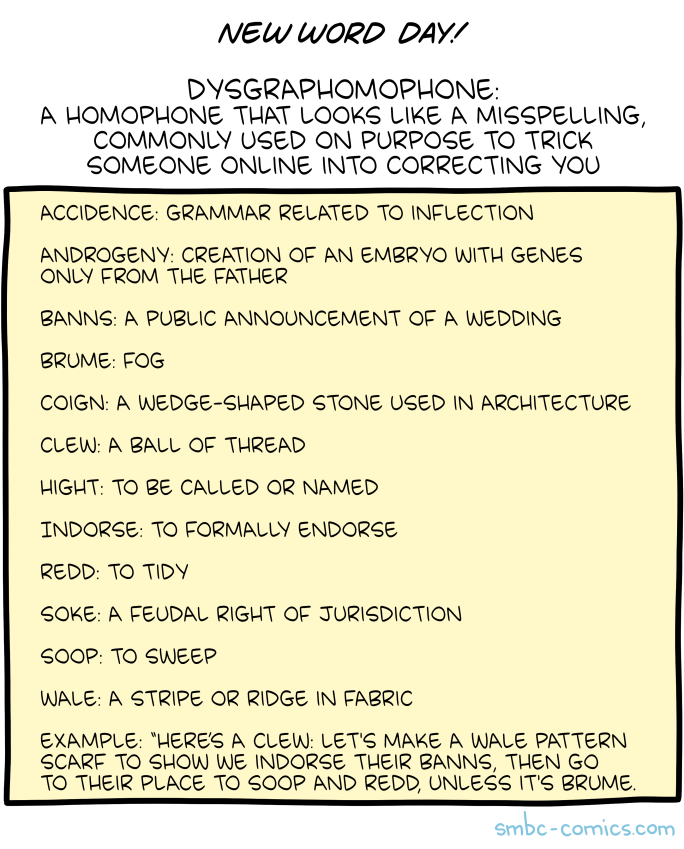
Click here to go see the bonus panel!
Hovertext:
Genuinely ashamed how much time was wasted on this.
Today's News:
Friendly Transit
I enjoy riding the subway in Toronto, or New York, but there’s something special about the London Underground or Tokyo Metro (or Japan’s railways at large) that sets them apart from systems in many other cities. And to be fair, I don’t just think this applies to just Toronto and New York — I get a similar vibe from Mexico City or even Berlin.
If you enjoy my content, consider subscribing to my blog:
or supporting me on Patreon:
Your support will help me bring you more content faster!
I think what differentiates the London transportation system from so many others around the world is that’s it’s quite… friendly.
While many cities have trains in their raw metallic finish or with only a single colour, London’s trains have almost all of the colours of the rainbow. The announcements also have a charm and happiness to them that I certainly don’t hear in Toronto’s robotic or human announcements. Odd as it might sound to a local, I’m also quite fond of the seats on London’s transit system: while much of the world has embraced hard plastic or even metal, London’s trains and buses get you around in surprising comfort.

The wayfinding system also has a friendliness to it: Navigation is simple and human — and unlike in Asia where numbers are often used to describe stations, or the US and Canada that usually use streets to name things, in London places rule the day. You aren’t a cog in the machine; the transportation system is there to whisk you away.
The stations also are rarely dingy, dark, or utilitarian. While it’s certainly a challenge to make “tube”-style stations feel like anything but dark and cramped, bright lighting, huge ad boards, and colourful tile work go a long way. And with so much of the tube either on the surface or skipping in-and-out of tunnel, you get a lot of natural light. The subsurface lines in particular benefit from this a lot, and many of the stations feel palatial, but not in a “I’m very deep under Pyongyang” sort of way, and more of a “ah, Kensington Palace in the sun, very nice.”

And Japan turns the friendliness up to 11. Like in London, few trains in Japan don’t have bright colours painted across them, and even the more utilitarian rolling stock is rarely fully monochrome. While there are practical reasons for the out-there design of the Shinkansen rolling stock, it’s also clear that the bullet trains looking like something out of the future — a nice future — is no accident.

Much like in London the announcements on trains in Japan are pleasant and sound happy, but even better – transit systems are often filled with musical tunes, announcing arriving trains, or the current station. Instead of just the sound of waiting passengers and wheels sliding across ribbons of steel you actually have gentle tunes.
Stations in Japan are rarely very fancy, but they feel chaotic in a good way. In New York City, the chaos of the subway is downstream of the rats, litter, mysterious liquids dripping onto the platforms, and worn concrete and steel. Japanese train and subway stations, while they often feel very old, are almost all well-lit, and filled with clearly modern touches, from bright tactile wayfinding, to the glossy plastic of newly-installed platform gates that let you get close, but not too close to the trains. On the surface, my recollection of most Yamanote line stations is that while they never really feel run down, they also don’t feel opulent. It’s transit for everyday comfort.
The staff make a world of difference too, when I get fare checked in Toronto it’s often by a group of large men in almost paramilitary-style all-black vests and slacks, while in London it was by TFL employees dressed in colourful suits. In many cities, when you ask a transit employee for help, you might get yelled at or only get a finger gesturing in a general direction, while in Japan it’s not uncommon to be walked across a giant station complex.

If you’re wondering what the broad technocratic takeaway from all of this is, I’m not sure there is one. In many places, the experience of taking transit is one of being “processed” or fed through a giant industrial machine. For those cities that manage to make travelling through them joyful and exciting, there’s something special that goes beyond transportation — a sense of care and functioning that even the fastest, most frequent train can’t replace.
A Regular Day in California, as Envisioned by Right-Wing Republicans
“Nearly half of Republicans believe California ‘not really American.’ ” — LA Times
After being jolted awake by yet another earthquake, I take a deep breath and compose myself. Ahhh… the sweet smell of smog. I rise, brew up a pot of fair trade coffee, and inject my arm with the mandatory daily vaccine.
Today is my birthday, and I’m going out with friends to celebrate, but I have some things to do beforehand. First, I need to write my monthly mortgage check: $800,000. But it’s no big deal, because I’m saving tons of money not owning a car thanks to our Supreme Leader Gavin Newsom outlawing them.
I strap on my facemask and head outside. I see Dave, one of the fifteen unhoused people living in my front yard. He shows me carpet swatches for the five-bedroom mansion our state legislature has voted to build for him, free of charge. Dave proudly confesses to me that this had been his plan all along and that getting a free house made all his time being treated as subhuman totally worth it. I hear him laughing maniacally as I scurry down the driveway on my electric rollerblades.
Blading along, I pause to engage in a moment of mindfulness. I am thankful to have this free time in the middle of the week since I don’t have a job. Only undocumented immigrants are allowed to have jobs. My status as a white American with a social security number has made me completely unemployable. I’m forced to support myself with the proceeds of my self-published book, Witchcraft for Vegans.
I make a pitstop at CVS to buy a replacement charger for my electric rollerblades. The line is so long, and I have an Anti-Heterosexuality Rally to get to. No worries. I can just walk out with it without paying. There are absolutely no penalties for stealing; you can have anything any time you want it.
As I’m leaving the CVS with my free charger, I am angrily confronted by a mask-less stranger about my choice of shopping bag. His bare face and aggression scare me, and I worry he may have one of those things I have always heard about called a gun. I think I saw a gun once, but I’m not sure whether it was real or I just hallucinated after smoking too much legal weed. It’s rumored that no one in the entire state of California has seen a real gun since we voluntarily tossed all of them into a giant U-Haul and gave them to Obama.
I pull down my mask, and summon the nerve to explain to the stranger that my shopping bag only looks plastic. I proudly show him my sustainably sourced bag made from recycled puka shell necklaces. It has the same texture, appearance, and function of real plastic. We laugh gleefully about the mix-up, and soon find ourselves deep in conversation. It turns out that we share a mutual enthusiasm for higher taxes.
It’s now 5 p.m. The sweet smell of urine and feces fills the air. Ah, San Francisco! I feel the delightful crunch, crunch, crunch beneath my feet… hypodermic needles blanket the ground like autumn foliage. San Francisco certainly is a dream city. I walk into a Starbucks to grab a coffee, and the barista asks if I’d like a complimentary line of cocaine with my order. A customer behind me snacks on magic mushrooms.
As the sun starts to set, I join my friends on the beach, and they present me with a gluten-free birthday cake shaped like Nancy Pelosi’s face. When I blow out my solar-powered, flame-free soy candles, I wish for the same thing I have for the past five years: the complete annexation of Austin, Texas.
Bob Menendez Repeatedly Tries To Jam Gold Bar Into Courthouse Vending Machine

NEW YORK—Mumbling “Oh, come on” as his ingot was rejected again, Sen. Bob Menendez (D-NJ) was repeatedly trying to jam a gold bar into a vending machine at a federal courthouse in Manhattan, sources confirmed Monday. “Stupid slot, why won’t you take my money?” said the 70-year-old disgraced lawmaker, who kicked the…
Strong thunderstorms are inbound to the Houston area: Please be weather aware this afternoon
In brief: Strong thunderstorms are approaching Houston from the southwest and will soon spread into the metro area. The period of 2 pm to 6 pm should see the strongest storms, with hail, damaging winds, a few tornadoes, and some street flooding possible. Please take this threat seriously.
As expected, we are seeing the development of strong thunderstorms to the southwest of Houston this afternoon. These storms will gradually progress eastward through the afternoon and early evening hours before they exit to the east. At this point the most severe weather appears likely to occur along and south of Interstate 10.
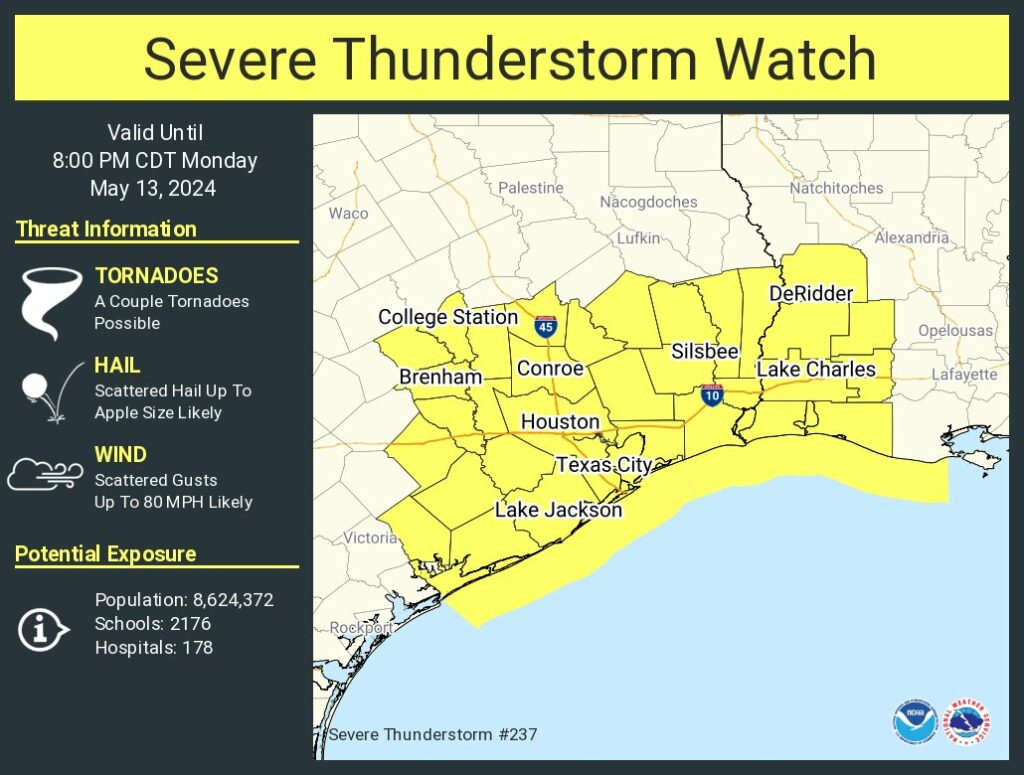
In terms of timing, I anticipate that showers and thunderstorms will begin to develop widely across much of the Houston metro area by around 1:30 to 2 pm. A more organized line of severe thunderstorms will subsequently march across the area from west to east from 3 to 6 pm. The strongest storms should be east of Houston before sunset, with some light showers possibly lingering a little while longer.
There is a fairly high risk of hail with these storms, particularly along and south of Interstate 10. The National Weather Service indicates that a few areas may see hail as large as an apple, but for most locations any hail that falls should be smaller than this. Damaging winds are also possible, as well as a few isolated tornadoes. Heavy rain will also accompany these storms, but the most intense showers should progress fairly quickly. Thus, while some street flooding is possible, we are not overly concerned about a significant flooding event.
We will clear out this evening, and then have a couple of calm days before rain, and possibly storm, chances return Thursday. Stay safe out there, y’all!

Trump Reflexively Asks Michael Cohen To Silence Michael Cohen

NEW YORK—During a brief recess from his ex-attorney’s testimony regarding hush money payments made shortly before the 2016 election, former President Donald Trump reflexively cornered Michael Cohen and asked him for help silencing Michael Cohen, courtroom sources confirmed Monday. “Listen, Michael, this guy Cohen…
Saturday Morning Breakfast Cereal - What the
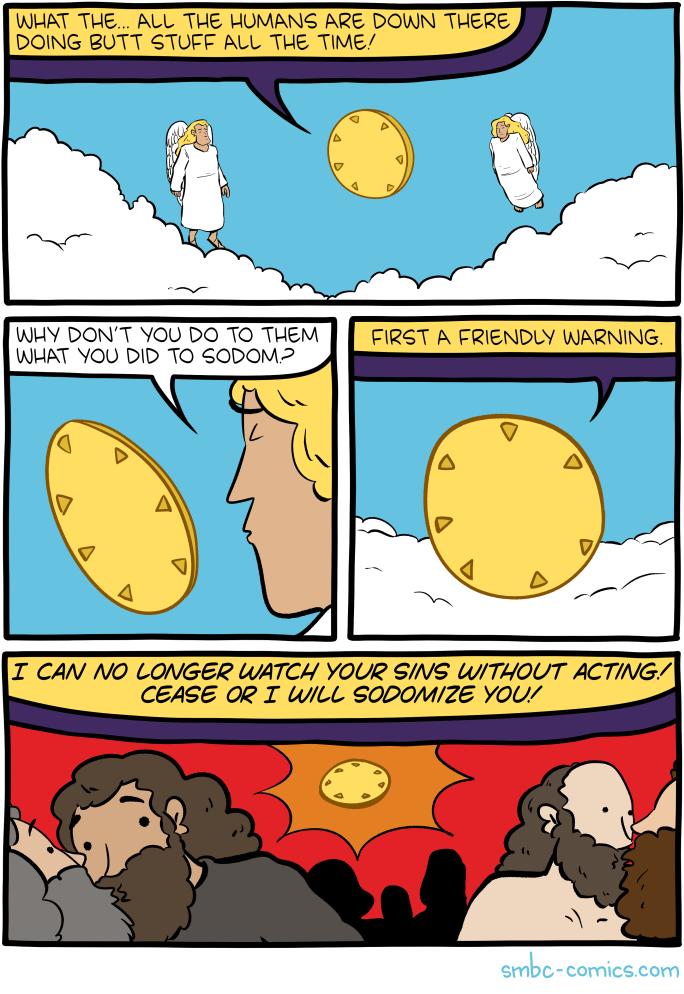
Click here to go see the bonus panel!
Hovertext:
Don't blame us - you're the one watching.
Today's News:
I don’t want to be pied in the face for work
This post was written by Alison Green and published on Ask a Manager.
A reader writes:
I work in a medium-sized location of a small-in-the-grand-scheme-of-things business as one of the upper managers on site.
The site manager recently asked me to keep an idea on the books for sometime later this year: to do a donation drive with manager names on donation boxes. Donations would earn someone a ticket to pie that manager in the face.
To keep the peace after a long day when I was already exhausted, I said I would keep it in mind, but I would not participate, period. I was told “your name is going on a box.” I said, “If that’s the case, you can find a new X manager. I’m not getting pied in the face!”
I have received “exceeds expectations” on my performance reviews and have delivered miracles for this place for the years I have been there. I tolerated a dunking booth previously because I could change out of wet clothes. A pie to the face would mean an intolerable experience with sticky hair and skin for my day, and my commute is not short enough to make it remotely okay.
I think the choice to participate should be opt in, not opt out. The site manager isn’t my actual manager (I report to our corporate office) and my boss usually has my back. I worry that I sound a bit childish for having this line, but I don’t want this one to be crossed! I am not comfortable with people smashing a pie in my face, throwing a pie in my face, or anything to do with pie and my face if it isn’t me willingly eating a slice! Am I crazy for being willing to lose my job over this?
(I am looking to move on due to this site manager, as I just truly don’t believe our leadership styles are compatible. I have stayed to protect my team and finish out a few critical tasks while I job search, but I am hitting my limit. Pie in the face is the tip of the bonkers iceberg that is my daily life.)
Yeah, you do not need to be pied in the face if you don’t want to be pied in the face. Under no reasonable definition does it fall within “other duties as assigned.”
And you know, that would be true even if you sucked at your job! It pained me to see you justify the reasons you shouldn’t have to be pied, like your “exceeds expectations” evaluations and so forth. Even if you delivered no value whatsoever and were on the verge of being fired, you don’t need to agree to be pied in the face if you don’t want to.
And really, employees who sign up for these activities assume that managers are participating willingly. Anyone who’s not mildly sociopathic would be horrified to find out that what they thought was a fun morale-booster was actually a terrible experience for the person getting pied.
I’m curious whether the other managers who would be expected to participate would do it happily or feel like you do. It might be worth talking to some of them and taking a united stand that it’s Not Happening, or that it be opt-in.
I’m also curious how likely this is to even come up again. The site manager asked you to file the idea away for later in the year. Feel free to simply … not. You’re a manager too and they’re not your boss; you’re free to use your own judgment to decide this was an obvious joke and/or terrible judgment.
But if it does come up again, you can simply say no. “No, I’m not participating.” “No, we’re not going to require employees to be struck in the face — assaulted — against their will.” “No.” And you can enlist your own boss, who will almost certainly support that stance. Might you be seen as a party pooper if others are on board? Maybe. But who cares? Your no is your no.
And worst case scenario, if the event comes to fruition, you can decline to attend. You can’t be pied in the face when your face isn’t present.
(I write all this with a very specific brand of professional expertise on the topic, because for a job in my 20s I pied several public figures to protest animal abuse. No regrets, still proud of it. But public protest intended to result in criminal charges, which it did, is a very different thing than a workplace team-builder.)
Severe weather likely today as a weak front moves into Houston: Damaging winds, hail are possible
In brief: Storms are likely in Houston today, after noon. The line of showers and thunderstorms may hit the area during the critical hours after school, or during the early portions of the evening commute, so please remain weather aware. After that we will have a couple of calmer weather days.
Monday
A number of ingredients for severe weather are stacking up this morning across the Houston area, including atmospheric moisture, instability, shear, and a trigger in the form of a weak front that will push through. All of these factors are likely to produce a line of showers and thunderstorms, some of which will be severe, that will move through Houston from northwest to southeast during the afternoon hours today.

In terms of timing, I expect conditions to warm and muggy this morning, with temperatures in the 80s and mostly cloudy skies. The action is likely to pick up shortly after noon, to the west of Houston. Locations such as Katy and The Woodlands are like to see the onset of storms between 2 and 4 pm, with the line moving into central Houston later this afternoon, perhaps between 3 and 5 pm, and reaching the coast between 4 and 6 pm. I realize the timing here in unfortunate, likely affecting parts of the metro area during school pick-up, afternoon activities, and the evening commute. Please check the radar before venturing out—conditions will be better in some locations than others.
With regard to impact, the line of storms should be fairly progressive as it moves through the area. So the worst of the rain, lightning, and other impacts, including damaging winds, hail, and possibly a few tornadoes, should not last too long. But these conditions may be briefly intense. Some street flooding is also possible during the strongest storms, in which up to 3 inches may fall fairly quickly. After the initial line of storms showers may linger for another hour or two. The bottom line is that today will be a day to be weather aware, especially from noon to around sunset. Not all areas will be affected by severe storms, but it does look like a fairly good chunk of the region will be.
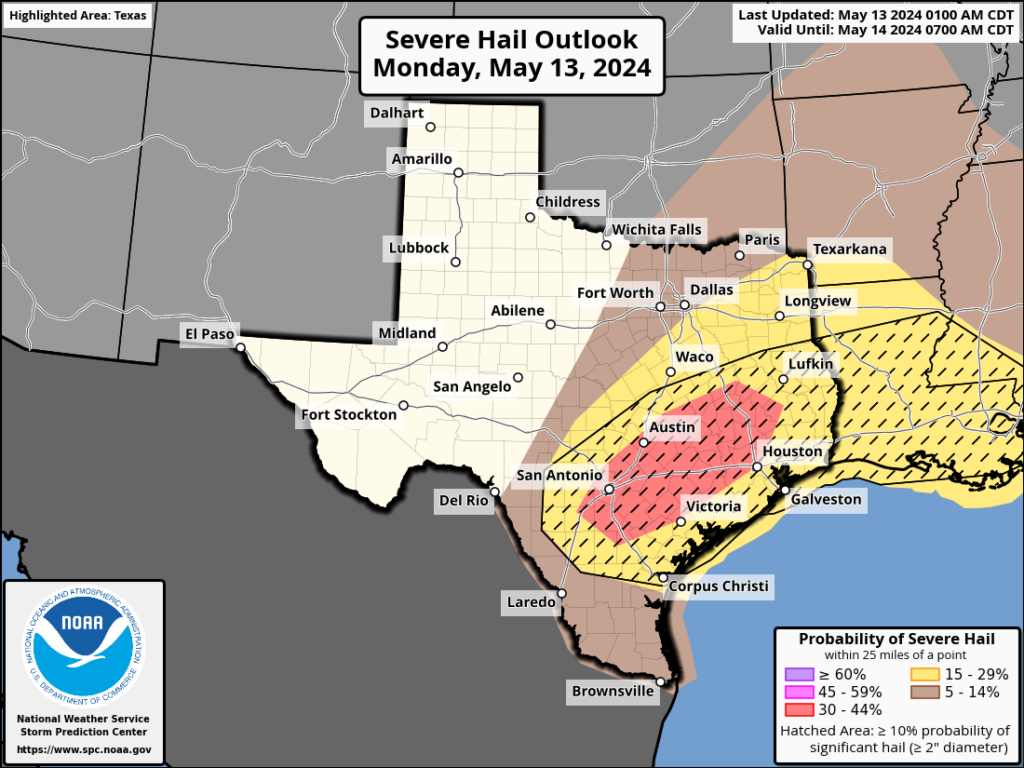
Temperatures tonight should fall into the upper 60s with mostly cloudy skies.
Tuesday
Expect sunnier skies and calmer weather in the wake of the front. Highs will reach about 90 degrees, aided by sunshine and the slight drier air that will allow them to pop up. Winds will be fairly light, from the north. Lows on Tuesday night should drop into the upper 60s again for most of the metro area, away from the coast.
Wednesday
Another sunny day with highs near 90 degrees. Winds will shift to come from the southeast during the day time, most likely, allowing for a slightly warmer and more humid night in the low 70s.

Thursday
More storm chances return on Thursday as the atmosphere becomes more amenable with passing disturbances. Right now let’s call for a likely chance of rain, but with lower confidence in the details. Expect highs in the mid-80s.
Friday
A chance of showers lingers, but the signal is not as strong for Friday. Look for highs in the upper 80s. Details to come.
Saturday and Sunday
The weekend looks mostly sunny. Saturday should bring temperatures in the upper 80s, with Sunday likely reaching the lower 90s. I can’t entirely rule out some passing showers on Saturday, but overall chances are near zero on Sunday.
Next week
It’s difficult to say too much, but at this point I expect summer lite conditions next week, with highs generally in the low 90s. High pressure looks to be mainly in control, but we’ll have to see if that actually comes to pass.

Waterfront Sand Castle

With 4 turrets, a dozen windows, and a saltwater moat, this massive home boasts a fantastic 360-degree view of both the ocean and hairy sunbathers. Hurry up and book a showing before it’s washed away for good.
Florida Students Given Lifelike Dolls To Simulate Responsibility Of Owning Slave
Congress Told ISPs To Remove All Huawei Network Gear, Failed To Fund The Effort, Then Just Forgot About It
Long before TikTok histrionics took root, you might recall that numerous members of Congress spent numerous years freaking about another Chinese company: Chinese telecom equipment maker Huawei.
The argument, made without much in the way of public evidence, was that Huawei was systematically using its network gear to spy on Americans at a massive scale. Congress then proposed a solution: it would require that U.S. telecom operators (large and small) rip out all Huawei equipment from their networks at great expense, then replace it with usually more expensive alternatives.
So in early 2020 Congress passed the Secure And Trusted Communications Act effectively banning Huawei from U.S. telecom networks. Congress doled out $1.9 billion to rip out and replace Huawei gear, but it’s estimated to cost around $5 billion to actually complete the effort. But instead of finishing the job, the FCC last week politely pointed out that Congress did nothing.
The costs were significant, but especially for smaller telecoms which may now be forced to withdraw from the program, or shut their networks down entirely without additional funding, the FCC wrote:
“Several recipients have recently informed the Commission that they foresee significant consequences that could result from the lack of full funding, including having to shut down their networks or withdraw from the program. Because Reimbursement Program recipients serve many rural and remote areas of the country where they may be the only mobile broadband service provider, a shutdown of all or part of their networks could eliminate the only provider in some regions.”
So basically Congress freaked out about Huawei (without much public evidence), proposed a very expensive solution to address the problem, didn’t fully fund the program, then basically fell asleep. Their apathy and dysfunction now risks putting some smaller ISPs out of business; ISPs that may be the only broadband provider available in some rural markets. Impressive work all around.
This is all fairly ironic given the hysteria Republicans like the FCC’s Brendan Carr have had about TikTok. Carr has made quite a career showing up on cable news to gnash his teeth over a social media network his agency doesn’t have the authority to regulate. Yet he’s not been anywhere near as active in pushing for a solution for a huge problem impacting a sector he actually regulates.
In part because the work of actually doing a coherent job doesn’t much interest an ad-engagement chasing press. The actually daily nitty gritty details of coherent governance isn’t sexy, and (usually) doesn’t get you on cable TV.
It all aptly demonstrates the often-performative nature of Congress’ hysteria over China. They’ll thrash and flail over some perceived Chinese threat to grab headlines and make U.S. competitors (like Facebook or Cisco) happy, throw out some barely workable solution (like say the TikTok ban), then consider their job done. Once the cable networks are no longer interested they’ll just forget about the problem entirely.







